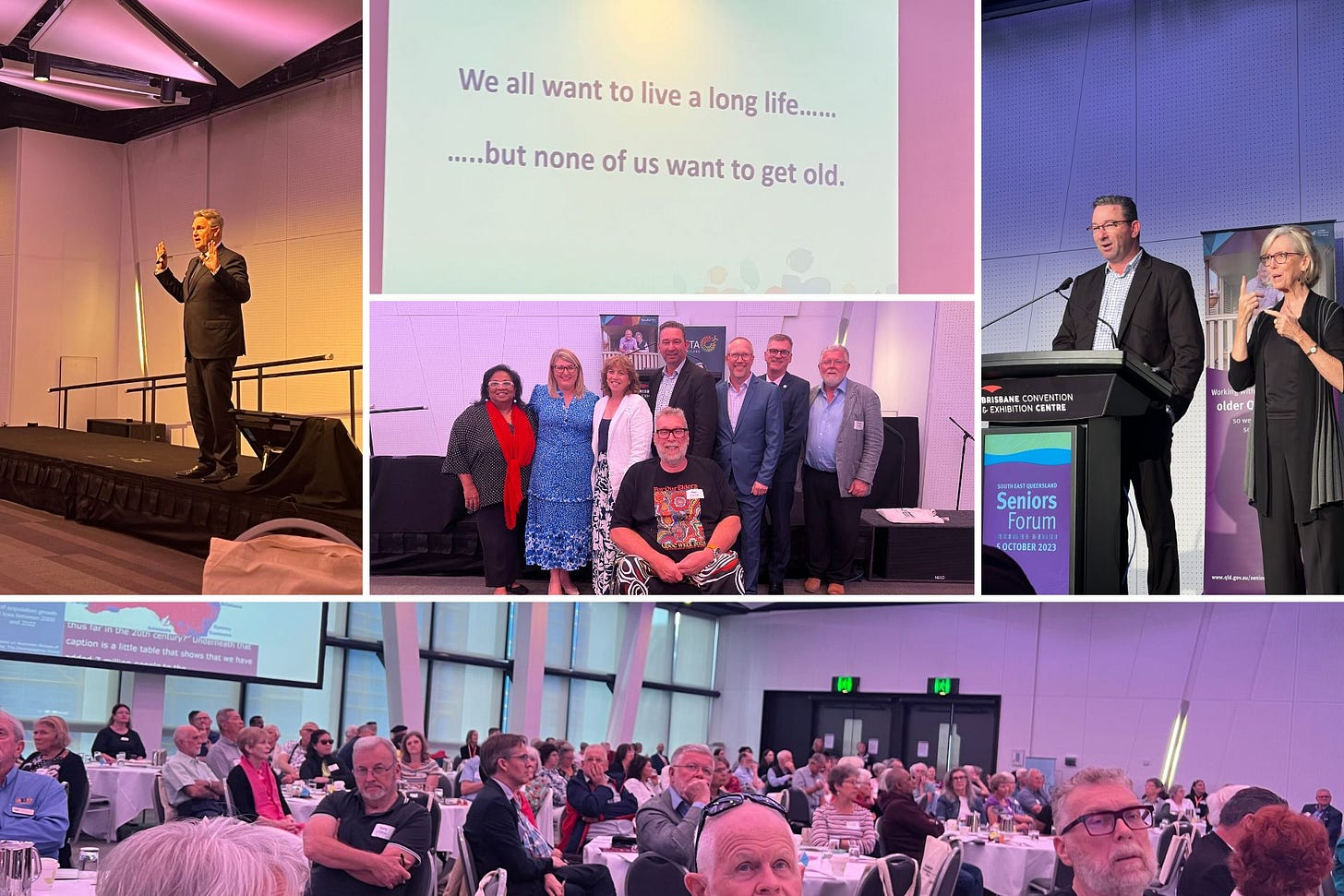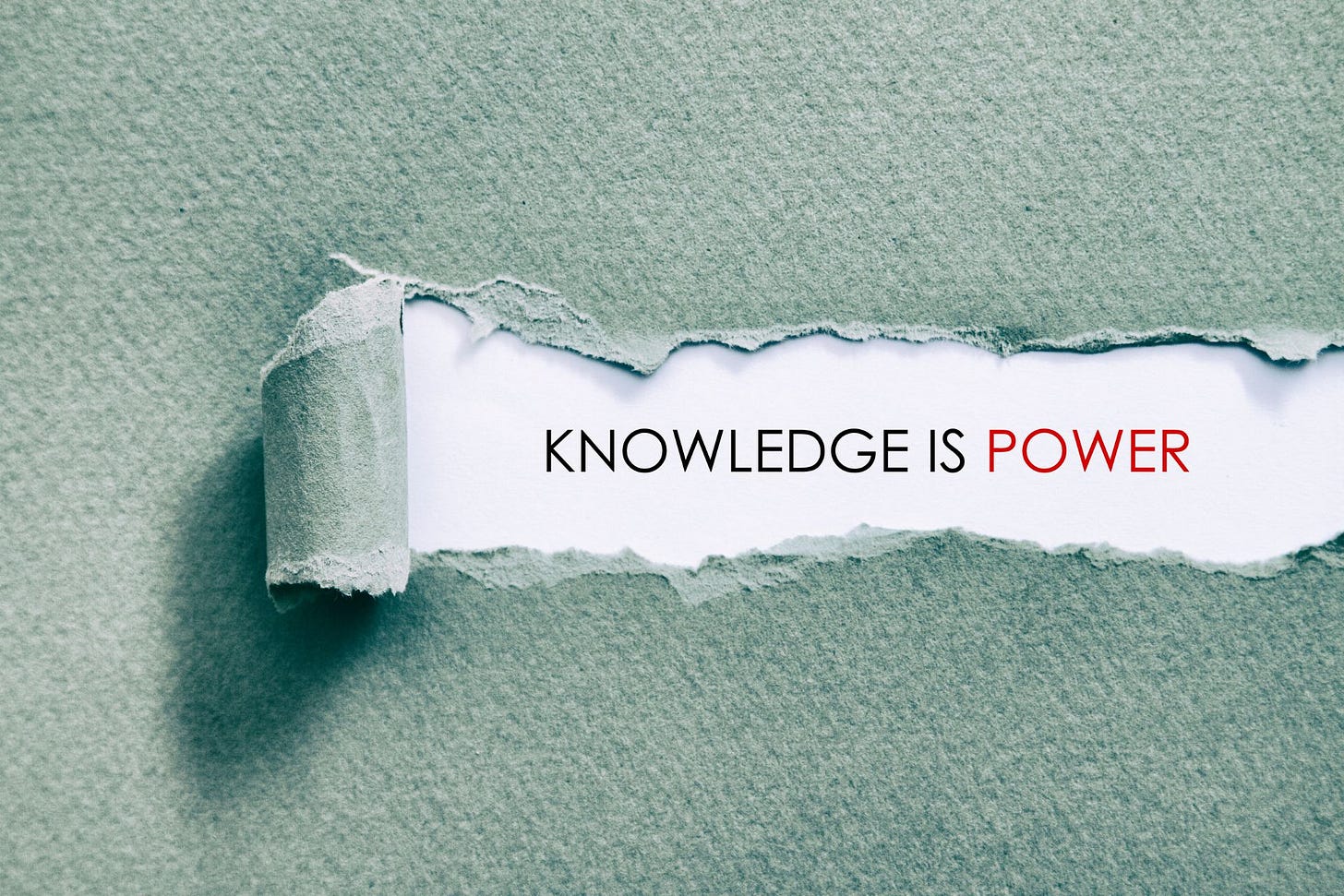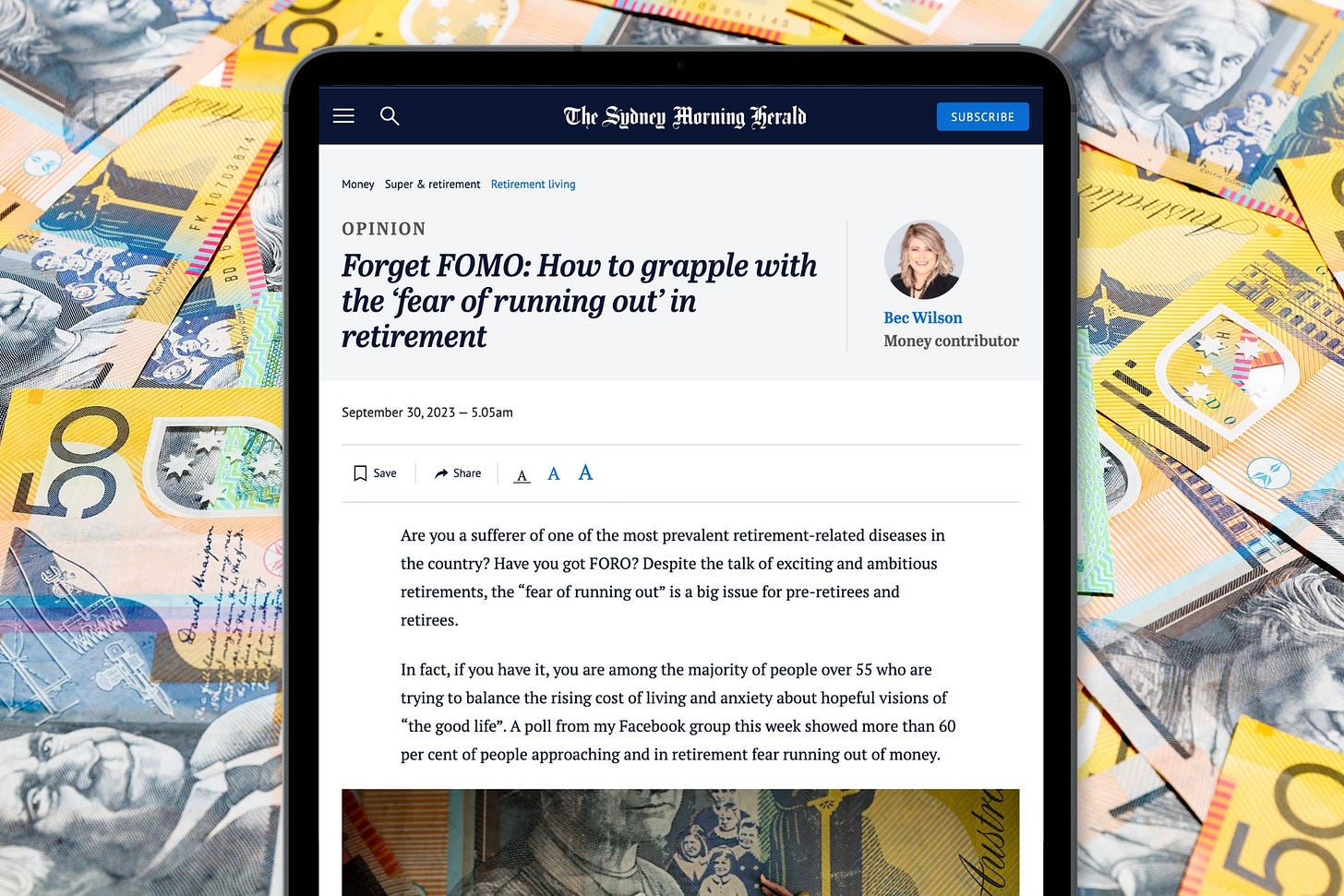Knowledge is power as you approach and enter retirement
And you don't have to learn these things the hard way. Here's four areas of knowledge I think you should make sure you have as you approach retirement.
In this week’s edition
Article: Knowledge is power as you approach and enter retirement
From Bec’s Desk this week
SMH/Age article: Forget FOMO: How to grapple with the ‘fear of running out’ in retirement
Sent in: A lovely short note sent to me by email
Knowledge is power as you approach and enter retirement
‘Knowledge is power.’ One of the guest speakers said that to a room full of older Australians at the Queensland Seniors Forum this week, and it could not be a more important message.
And more importantly, knowledge is power as you approach and enter retirement, traversing so many unknown topics for the first time in your life. But knowledge is hard to build up any way other than through learned experiences - AKA - the hard way! And I think you can learn a few things without the mistakes, if you want to.
So today I’ve decided to offer you some greater power, by listing off some of the knowledge and titbits I think you should make sure you have as you approach retirement.
Your superannuation: learn how your financial foundations work!
Understanding superannuation is paramount. Many people wake up somewhere in their mid-50s or even 60s and suddenly realise they need to pay attention to their superannuation. And while it’s not too late, it’s certainly not the best time to start!
To grow into a really big (or even moderate) nest egg, your superannuation needs you to deposit money into it as early in life as you can afford to; ensure it is invested well at every stage of your life; and give it time to grow. Compound investing IS the key to superannuation growth!
But the knowledge you need goes much further. Take the time to grasp the concessional and non-concessional contributions, the downsizing incentive, and your options for risk taking and investment. Think about how the accumulation phase works, and how the retirement phase works - because they are very different.
And, ask your superfund about the tools they provide to help you understand your money, the retirement education they can offer you, and the financial advice options they have for their members. Remember - knowledge is power! If your head’s in the sand - you have no power! (Tell ‘em I sent you - many are waiting for your call!)
The Age Pension: Don’t be too proud to learn about the age pension
62% of Australians over 67 access some form of age pension. It boggles me that people under that age think the pension is only for a minority group. The age pension’s eligibility is calculated by a combination of the assets test and the income test. And, if you would like to understand whether you can access up to nearly $43,000 per year as a couple or $28,500 per year as a single person from the age of 67, PLUS a whole raft of pension benefits, like the pension concession card, rent assistance, and more - take the time to learn.
It’s also worth knowing that if you aren’t eligible for the age pension, you might find you are eligible for the Commonwealth Seniors Health Card (CSHC).
If you don't dive in and learn, you’ll never know. Or, maybe you’ll find yourself missing out on months of years of supplementary income you might have been able to enjoy. Because they don’t backpay if you apply months or years later.
Your health: Learn how to monitor your body’s key health markers
You need to learn how your body really works in the second half of life if you want to slow the undesirable parts of ageing health decline. Knowledge of what to check and watch for is critical. So, take the time to learn and, remember that as Australians with a medicare card, you have access to an extraordinary number of high quality preventive health tests at a very low and sometimes NO cost to you. These could allow you to catch cancer, dementia, heart disease or diabetes long before they cause irreparable damage to your body, and shorten your healthspan earlier than necessary. Some of the things you need to know (and are covered in detail in the book) include:
Act on inflammation in your body, it’s one of the biggest risk factors for the diseases of ageing like hypertension, dementia, and even cancer.
Get your hearing checked if it’s waning - it’s a huge risk for future dementia issues.
Worry about your waistline - it’s a predictor of premature death.
Look out for the warning signs of metabolic syndrome that often leads to diabetes.
Monitor your blood pressure and cholesterol - the cause of coronary heart disease among many other problems.
Get your mammograms for women, PSA blood tests for men, and everyone, please take your bowel cancer screening test when it comes in the mail. Cancer sux!
Don’t forget to check for skin cancer regularly, and
Keep your teeth in good condition. Poor dental hygiene can lead to gum disease, which is associated with health issues like diabetes, heart disease, and respiratory infections.
And just for fun - learn how to get great deals on travel
When you retire, you have more time to travel. But most people are trying to stretch their dollars as far as they will go. So I love to tell you the tricks of the trade, so you can, get yourself far better deals - if you want to go to the effort.
But, I’d be crazy if I gave these ones away in a free newsletter. You’ll have to buy yourself a copy of ‘How to Have an Epic Retirement’ for these. You’ll find them on page 277-281. Yep - pages of ways to get great deals on travel.
Of course, there’s heaps of other areas where you will benefit from greater knowledge. Think about these if you get some time. All the items above, and below are covered in my book too.
Budgeting for retirement - I think this one is pretty important. So important, that when you buy the book, I give you a free excel budgeting template.
Travelling solo - About 33% of retirees are doin’ it solo, so why not learn a few tips and tricks about how to find good options.
Preparing your will, estate plan and Enduring Power of Attorney - they’re not something that any of us should put off to the future. But they’re not necessarily expensive and complex processes either.
Banking as you approach and enter retirement - banks have a very different attitude to people after they no longer receive a paycheck! Prepare yourself.
And lots more! Get your copy here.
From Bec’s Desk
It’s been a busy week. I’ve been filming our pre-retirement education course, recording the new podcast that’s coming very soon, and learning my TEDx talk (I’m still struggling with memorisation if you have tips!) - and that is keeping me out of trouble.
Last weekend I did a big article in The Sydney Morning Herald and The Age on the fear of running out of money before we retire. It’s more common than you think and I’ve got some tips if you feel it too. Read it here.
I spent all day Thursday as the MC of the South East Queensland Seniors Forum, the largest event of its kind that I can remember the government running in recent years. Run by the Department of Child Safety, Seniors and Disability Services in partnership with the Committee on the Ageing (COTA) it was a wonderful opportunity to share information from thought leaders with the 200+ seniors that were in the room and more than 500 attending online, and ask them what they thought about key issues. And it was great to see the Minister, the Hon. Craig Crawford MP and many from his department there all day as the event drivers, keenly and enthusiastically making it happen.

Well done to everyone involved and everyone who attended. It’s great to see our Queensland Government listening to the issues of modern ageing, and looking for ways to respond at the coalface. I can only hope other states are taking Seniors and our modern ageing issues this seriously.
I’m doing more and more guest speaking and MCing of events that serve people in the second half of life. So reach out if you’re feeling inspired for an upcoming event. I love doing it.
Read on, it’s a shorter newsletter this week. Hope you enjoy it!. I really njoy reading your emails. Just reply to this email and I’ll get your note in my inbox. Say hi! Tell me your thoughts and ideas too.
And, don’t forget to leave a comment and a like on the post here:
Please, have a wonderful week and make it epic!
Many thanks! Bec Wilson
Author, columnist, retirement educator, and keynote speaker
Forget FOMO: How to grapple with the ‘fear of running out’ in retirement
This article first appeared in the Sydney Morning Herald, The Age, Brisbane Times and WA Today on Sunday 1st October 2023. Read it here.
Are you a sufferer of one of the most prevalent retirement-related diseases in the country? Have you got FORO? Despite the talk of exciting and ambitious retirements, the “fear of running out” is a big issue for pre-retirees and retirees.
In fact, if you have it, you are among the majority of people over 55 who are trying to balance the rising cost of living and anxiety about hopeful visions of “the good life”. A poll from my Facebook group this week showed more than 60 per cent of people approaching and in retirement fear running out of money.
As a nation, we’ve been contributing to super for 31 years. And despite this, the reality is, most Australians only get their act together on their superannuation growth strategies in their 50s and 60s.
Before this, they are busy raising their kids and paying off their mortgages and have little left over for long-term savings. And that means many people in the next decade will be scrambling to put together enough super to live comfortably in their retirement – despite the trillions of dollars in the retirement system.
The median superannuation balance of people aged between 55 and 74 in Australia currently sits somewhere between $150,000 and $200,000, well below the amount that the Australian Superannuation Funds Association (ASFA) says will afford you a comfortable retirement.
A comfortable retirement, according to ASFA requires you to have $595,000 for singles and $690,000 for couples in your superannuation, as well as access to a part pension. And this assumes you own your own home outright. So if you are one of the average pre-or-post retirees who simply don’t have this much in super, how do you manage your FORO?
I’ve watched many retirees navigate life with this fear, and live full and energetic lives.
There’s no easy answer, but I’ve put together some practical steps you can take so you can at least reason with your fears. Read it on the Sydney Morning Herald here. It’s a free to access article (you may need to register).
How to Have an Epic Retirement is the ultimate guidebook for modern retirees. It is grounded in my own widespread research on modern retirement, and draws on my prior ten years as the CEO of Starts at 60 and Travel at 60 (before I stepped away to pursue my next career in retirement education). It also draws on the work of the leading thinkers in the longevity, health, happiness, purpose and modern ageing spaces and incorporates many interviews with people who have navigated the sometimes challenging path into retirement.
Sent in…
This little titbit arrived in my inbox this week from Jenny in our community. She just wanted to share the inspirational quote from a book she’s reading. It’s a good one. Enjoy!
“…for life transitions to become successful rites of passage, they require three steps: letting go, liminal time, and new beginnings. Letting go refers to leaving behind past roles, attitudes, regrets, and identities that no longer serve our development so that we can move forward. Liminal time, or the neutral zone, refers to the fallow period between identities in which we feel lost, formless, empty, and afraid. It’s a bit like a chrysalis—no longer caterpillar, not yet butterfly. And it may include deep grieving for all that has been lost. New beginnings refers to the emergence of a new sense of self, passion, purpose, and vision—and, I would add, a potential next stage of awareness.”
- The Inner Work of Age by Connie Zweig










As I read the experiences of other 60+ folk I ponder, How do we know when it's an appropriate time to "downsize" to a Level block, single level living life. We were taught, "Use it or lose it". So saying Goodbye to stairs SCARES me.